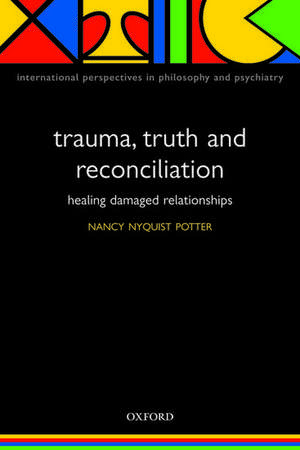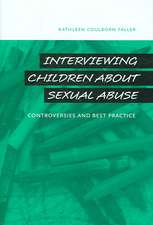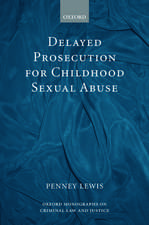Trauma, Truth and Reconciliation: Healing damaged relationships: International Perspectives in Philosophy & Psychiatry
Editat de Nancy Potteren Limba Engleză Paperback – 24 aug 2006
| Toate formatele și edițiile | Preț | Express |
|---|---|---|
| Paperback (1) | 475.08 lei 32-37 zile | |
| OUP OXFORD – 24 aug 2006 | 475.08 lei 32-37 zile | |
| Hardback (1) | 824.09 lei 32-37 zile | |
| OUP OXFORD – 24 aug 2006 | 824.09 lei 32-37 zile |
Din seria International Perspectives in Philosophy & Psychiatry
- 5%
 Preț: 552.58 lei
Preț: 552.58 lei - 13%
 Preț: 322.49 lei
Preț: 322.49 lei - 24%
 Preț: 542.84 lei
Preț: 542.84 lei - 24%
 Preț: 541.08 lei
Preț: 541.08 lei - 23%
 Preț: 476.22 lei
Preț: 476.22 lei - 23%
 Preț: 543.69 lei
Preț: 543.69 lei - 23%
 Preț: 498.95 lei
Preț: 498.95 lei - 23%
 Preț: 544.39 lei
Preț: 544.39 lei - 24%
 Preț: 471.81 lei
Preț: 471.81 lei - 23%
 Preț: 413.41 lei
Preț: 413.41 lei - 18%
 Preț: 364.04 lei
Preț: 364.04 lei - 18%
 Preț: 516.69 lei
Preț: 516.69 lei - 24%
 Preț: 458.13 lei
Preț: 458.13 lei - 23%
 Preț: 375.59 lei
Preț: 375.59 lei - 14%
 Preț: 327.50 lei
Preț: 327.50 lei - 27%
 Preț: 566.67 lei
Preț: 566.67 lei - 23%
 Preț: 465.20 lei
Preț: 465.20 lei - 28%
 Preț: 481.03 lei
Preț: 481.03 lei - 23%
 Preț: 383.99 lei
Preț: 383.99 lei - 28%
 Preț: 424.71 lei
Preț: 424.71 lei - 24%
 Preț: 540.23 lei
Preț: 540.23 lei - 27%
 Preț: 340.88 lei
Preț: 340.88 lei - 14%
 Preț: 560.55 lei
Preț: 560.55 lei - 22%
 Preț: 578.19 lei
Preț: 578.19 lei - 23%
 Preț: 365.13 lei
Preț: 365.13 lei - 41%
 Preț: 294.77 lei
Preț: 294.77 lei - 27%
 Preț: 341.49 lei
Preț: 341.49 lei - 27%
 Preț: 432.12 lei
Preț: 432.12 lei - 19%
 Preț: 413.64 lei
Preț: 413.64 lei - 14%
 Preț: 482.19 lei
Preț: 482.19 lei - 23%
 Preț: 510.02 lei
Preț: 510.02 lei - 20%
 Preț: 592.34 lei
Preț: 592.34 lei - 23%
 Preț: 442.80 lei
Preț: 442.80 lei - 19%
 Preț: 323.05 lei
Preț: 323.05 lei - 25%
 Preț: 522.30 lei
Preț: 522.30 lei - 19%
 Preț: 403.13 lei
Preț: 403.13 lei - 19%
 Preț: 456.39 lei
Preț: 456.39 lei - 23%
 Preț: 384.56 lei
Preț: 384.56 lei - 14%
 Preț: 494.81 lei
Preț: 494.81 lei - 19%
 Preț: 528.27 lei
Preț: 528.27 lei - 17%
 Preț: 475.11 lei
Preț: 475.11 lei - 14%
 Preț: 386.21 lei
Preț: 386.21 lei - 24%
 Preț: 381.69 lei
Preț: 381.69 lei - 23%
 Preț: 393.35 lei
Preț: 393.35 lei - 27%
 Preț: 327.31 lei
Preț: 327.31 lei
Preț: 475.08 lei
Preț vechi: 619.46 lei
-23% Nou
Puncte Express: 713
Preț estimativ în valută:
90.91€ • 97.21$ • 75.80£
90.91€ • 97.21$ • 75.80£
Carte tipărită la comandă
Livrare economică 07-12 aprilie
Preluare comenzi: 021 569.72.76
Specificații
ISBN-13: 9780198569435
ISBN-10: 0198569432
Pagini: 316
Dimensiuni: 155 x 233 x 18 mm
Greutate: 0.49 kg
Editura: OUP OXFORD
Colecția OUP Oxford
Seria International Perspectives in Philosophy & Psychiatry
Locul publicării:Oxford, United Kingdom
ISBN-10: 0198569432
Pagini: 316
Dimensiuni: 155 x 233 x 18 mm
Greutate: 0.49 kg
Editura: OUP OXFORD
Colecția OUP Oxford
Seria International Perspectives in Philosophy & Psychiatry
Locul publicării:Oxford, United Kingdom
Recenzii
This is not a handbook of 'How to do forgiveness', nor a self-help guide; rather, it is an exploration of why forgiveness seems so often to be a vital component of the healing process and of what happens when forgiveness does not happen. By combining insights from philosophy, sociology and psychology, this volume is a valuable addition to the literature on conflict, and a useful resource for anyone encountering traumatic situations where forgiveness may prove helpful in the journey towards recovery.
This is a book about a singularly important topic: how do we repair relationships after a wrong, often a wrong so severe that it cannot be simply rectified? How, after either personal or communal abuse or trauma, do we avoid the vortex of recrimination and retaliation? It is a book that deserves to be read slowly and taken seriously... an important book [that] should interest students and scholars of many disciplines. Most of all it should interest those concerned for the human condition.
This is a book about a singularly important topic: how do we repair relationships after a wrong, often a wrong so severe that it cannot be simply rectified? How, after either personal or communal abuse or trauma, do we avoid the vortex of recrimination and retaliation? It is a book that deserves to be read slowly and taken seriously... an important book [that] should interest students and scholars of many disciplines. Most of all it should interest those concerned for the human condition.
Notă biografică
Nancy Nyquist Potter received her Ph.D. in Philosophy in 1994 from the University of Minnesota and she is currently an Associate Professor of Philosophy at the University of Louisville. Her research interests range from virtue ethics to the role of humor in conflict to philosophy and mental illness. She is Vice-President of the Association for the Advancement of Philosophy and Psychiatry, an Associate Editor for the journal Philosophy, Psychiatry, and Psychology, and serves on local hospital ethics committees and councils.

















